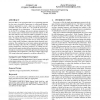107 search results - page 8 / 22 » Facilitating worst-case execution times analysis for optimiz... |
IPPS
1999
IEEE
13 years 12 months ago
1999
IEEE
Both inherently sequential code and limitations of analysis techniques prevent full parallelization of many applications by parallelizing compilers. Amdahl's Law tells us tha...
CODES
2008
IEEE
14 years 2 months ago
2008
IEEE
Processor Idle Cycle Aggregation (PICA) is a promising approach for low power execution of processors, in which small memory stalls are aggregated to create a large one, and the p...
MICRO
1993
IEEE
13 years 11 months ago
1993
IEEE
Compile-time code transformations which expose instruction-level parallelism (ILP) typically take into account the constraints imposed by all execution scenarios in the program. H...
WCET
2010
13 years 5 months ago
2010
Calculating the worst-case execution time (WCET) of real-time tasks is still a tedious job. Programmers are required to provide additional information on the program flow, analyzi...
CGO
2007
IEEE
14 years 1 months ago
2007
IEEE
The JavaTM programming language does not allow the programmer to influence memory management. An object is usually allocated on the heap and deallocated by the garbage collector ...

